Civilization was one of the first computer games I really learnt anything from. I'm not sure when I first played it, but Wikipedia says it was released in 1991 so I guess around age 10-12. I was terrible at geography in school. I had one of those teachers that puts you off the entire subject. Looking back, I certainly learnt more from Civ about world history than I ever did from that awful class.
It's essentially a whistle-stop tour of the biggest hits of engineering and technology. Near the start you're researching (and building) granaries, libraries and temples. Aqueducts make bigger cities possible. Nuclear plants give a huge production boost. All these things are very obvious as an adult -- but to a shy 12 year old, it made concrete some idea of technology, civilization and a rough overview of history as a whole.
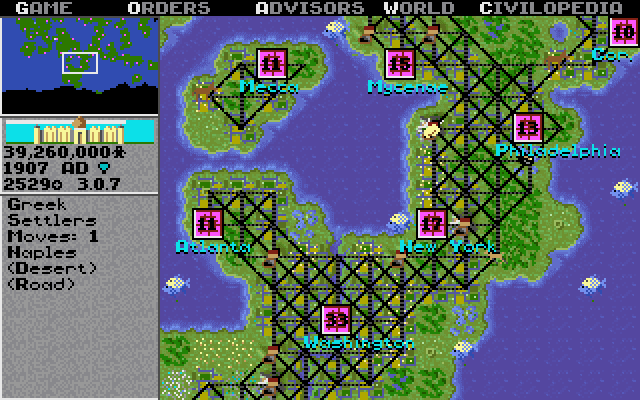
Screenshot of Civilization 1. It's come a long way!
It also taught me about various world leaders (Shaka? Hammurabi? Who are they?) and 'wonders of the world' ranging from the Oracle to a cure for cancer. These features all got expanded and improved through successive Civ games (we are now on Civ 5).
More profound than any of these "general knowledge" themes was an insight into the inevitability of war. A common scenario, as a peaceful civilization, is to get attacked by an aggressive neighbour. After raising an army to fight off the invaders (at significant time and cost), you have a huge, veteran army, costing you a fortune to maintain. What do you do? Disband them all? Of course not -- you send them to roll over the next nearest neighbour.
This experience was one of the most moving things for me. I was dedicated to pacifism as a kid (I couldn't bear to watch the news when I was young for all the death), and as soon as I was placed, if only virtually, in the shoes of one of these world leaders, I made the same decision. While other games I liked at the time like Dune 2 or Syndicate were explicitly about violence, it was an integral part of the game: the objective is to kill people, by following the path laid out for you by the game. In Civ however, the decision to go to war is that, a choice: it's perfectly possible to win without attacking anyone by science or culture 1, and the decision to go to war is entirely down to the player. Yes, I could choose to simply stand down and win another way. But inevitably, instictively, war just seems so... natural.
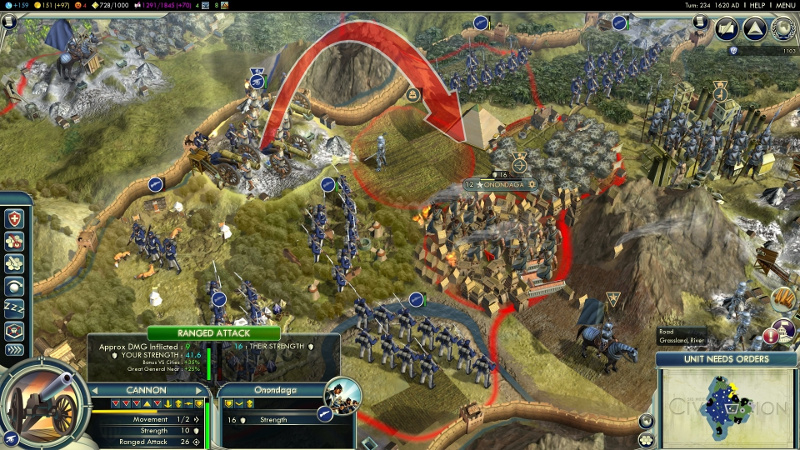
Screenshot of Civilization 5 showing a big army. Pew pew pew.
Explore, Expand, Exploit, Exterminate
Of course, Civ is very much a game about colonialisation. There is a winner. There is a pre-defined tech tree, which reflects a Western, scientific-industrial timeline. The genre is generally called "4X": eXplore, eXpand, eXploit, eXterminate. There is very little in the game to do with slavery, equality, dwindling natural resources, or pollution2. The title of this section refers to the retrospectively given name for the genre: and sums up not just the game mechanics, but the goal of capital and colonialism in general, on which most of these games are based.
Another "grand strategy" game, Europa Universalis 4, offers a very fine-grained simulation of the early modern world, starting in 1444 at the beginning of Early Modern history. For my first playthrough of EU4, the game recommended Portugal, for whom the ideal strategy is go to colonize North Africa and the Caribbean. This is done very abstractly, with "explorers", who go and "establish colonies", with potential countries being rated by the value of the land and the "hostility" of the natives. At least this game does have some acknowledgement of the horrors: some countries produce wheat, or iron, or gems, but some explicitly produce slaves. Aside from that though, there isn't really much to do. It's very sanitized.
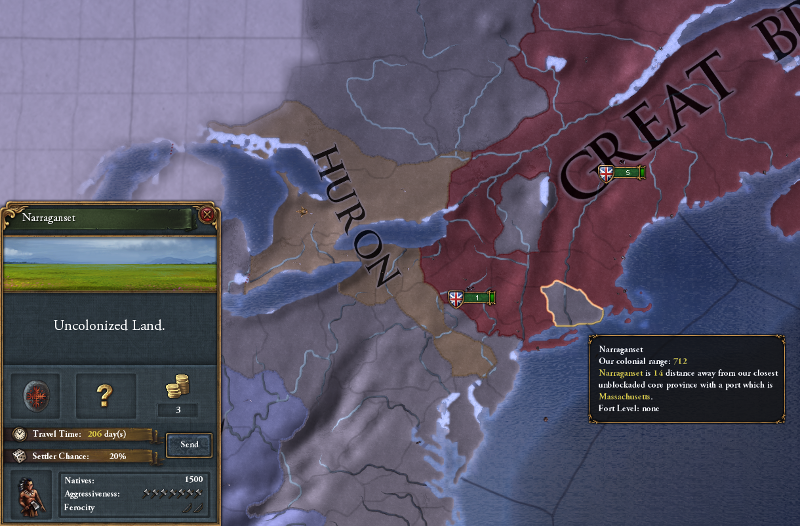
Screenshot of Europa Universalis 4, showing some fertile land ripe for the taking… if you can get past those "aggressive" natives.
Even outside "history"-based strategy games, the issue of work and workers is usually highly downplayed. Even RTS games like Starcraft and Warcraft 3, like Civilization, usually have a single "worker" unit, which is generally the cheapest unit in the game, doesn't upgrade or go obsolete (unlike military units), never revolts, and generally does very little all game apart from harvesting resources.
Why is it that slavery, and work, are so underplayed in not just these games but games in general? Given what a fundamental part it is of any "build an army/civilization/culture" narrative, how come the actual mechanics of 4X games are so underplayed? Why do games commonly have veteran units and high technology but no trade unions, management innovation, or master builders3?
The other kind of learnt violence is in any kind of "god" game, where the user is an omnipotent overmind that communicates via perfect telepathy. Even benevolent games like Cities: Skylines have this mechanic baked in: your minions do what you want, your actions are taken immediately and perfectly, and there is noone to answer to at any time. What would a city planning game be like that put you in the role of negotiator, politician, planner? What would an army game be like where the game took place in a secret bunker, with out-of-date intel relayed to giant screens and no ability to issue orders directly? Even the God Emperor perspective itself I think has given us poorer, less fertile, safer games, that do nothing if not keep us at a safe, critical distance from something that we should be engaging with more sincerely.

Screenshot of Cities: Skylines. Nicely free of pesky humans to deal with.
Board games
This obfuscation of underlying themes is often at its most extreme in board games. Board games are currently very much in a golden age of development, so this should be thought of as a modern development, based on lessons from videogames, not the other way around. And in board games comes one of the rare occasions games do focus on work: worker placement "Eurogames".
The most cited example of a complete gloss is Puerto Rico, and for good reason. This game is the polar opposite to a simulation game: it's very much a Eurogame, perhaps best thought of a mathematical puzzle with a vague theme added on top. From the game's description:
In Puerto Rico players assume the roles of colonial governors on the island of Puerto Rico. The aim of the game is to amass victory points by shipping goods to Europe or by constructing buildings.
Each player uses a separate small board with spaces for city buildings, plantations, and resources. Shared between the players are three ships, a trading house, and a supply of resources and doubloons.
The resource cycle of the game is that players grow crops which they exchange for points or doubloons. Doubloons can then be used to buy buildings, which allow players to produce more crops or give them other abilities. Buildings and plantations do not work unless they are manned by colonists.
That's about the last time that the word "colony" is used. "Colonists" can only be interpreted as slaves, in this game: reduced to coloured blocks of wood. In board game parlance, this is a "worker placement game" -- you assign workers to tasks, which give you things. So somehow "slave" (real life) becomes "colonist" (game manual) becomes "worker" (in common use), a chunk of wood completely void of theme that does exactly what you ask, doesn't upgrade, have any needs, and doesn't answer back.
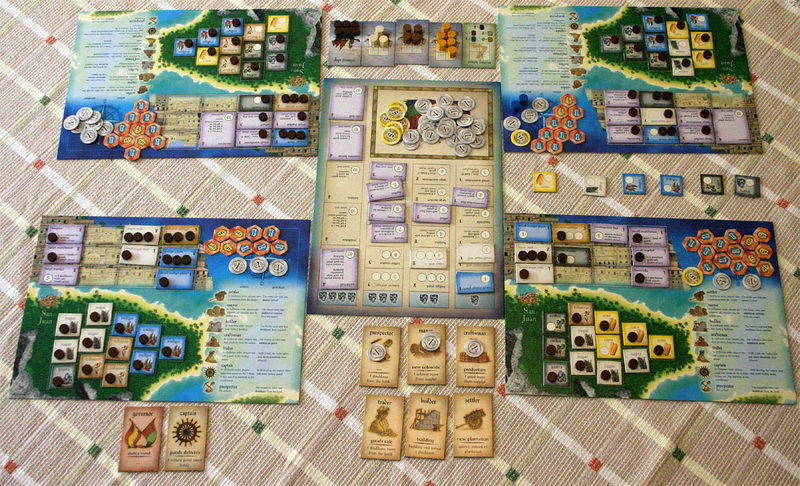
Puerto Rico. The circular purple disks are slaves.
Bruno Faidutti has written an excellent article on this topic (scroll down for the English version). He states simply:
The problem in Puerto Rico is not that there are slave tokens, it is that they are called colonists. The problem with Saint Petersburg is that one of the worst episodes of forced labour in modern European history is treated as a good spirited competition between hardworking craftsmen.
I agree with this. I also go further, and suggest that as a pedogogical tool, these games teach that slavery is trivial, and its use as a tradable commodity an inevitable element of the past. I've not played Saint Petersburg, but Purto Rico has no aspect of slave revolt, of the problamatic nature of the central concept: slavery becomes a purely abstract concept for the exploitation of the players.
Otherwise excellent review site Shut Up and Sit Down, which is partially responsible for my interest in board games and possibly some of the best journalism on the subject, is just as guilty in this respect. In two reviews now, they've chosen to review games with slavery as an abstract or explicit element, and completely glossed over it as a problem other than acknowledging it exists. In rounding up, in neither review was it acknowledged that a reason for not buying them is a completely problematic theme which would be seen as laughably oversimplistic if not racist in any other context.
Why is this? What other kind of self-respecting literary review would so easily gloss over such a crass central element? SU&SD did cover one game explicitly focussing on slavery: Underground Railroad, but this mostly seems to be an "oh isn't it awful" style review that asked no questions of the absence of the theme from other games. I don't mean to bash SU&SD, as at least they mention the theme: It's a problem affecting the entire industry, and not something that can be fixed lightly especially given the huge quantity of games with this theme.

Imperial Settlers. Yes that's the real name of an actual, unironic game.
In many ways this feels like an example of one of the key critiques of #GamerGate. One of the debates in the Game Gate furore is over the idea of the "Gamer" as the "core demographic" audience for games. In other words, this literature argues, "gamer" is an identity manufactured by the games press and industry to justify 95% of games being targeted at white, 14-30 year old men. Part of the invention of the "gamer" identity is a focus on "mechanics" as the central experience. Theme, narrative, design and sound don't matter if a game plays well. Increasingly accurate simulations of shooting people seem to be released on an almost weekly basis. And, games go from being targeted at everyone, to targeted at the euphemistically titled "core demographic"
Board games and board game journalism feels like it has a similar problem. There is clearly some kind of recognition of the poor taste and unimaginative themes going into modern boardgames, but publishers and seemingly designers either don't care about changing themes, or see it as too risky. And review sites tend to err on the side of design, judging the new Essen hit Venitian Slave Trading is so elegant, so well designed, the designer is so talented, and look at the card stock and wooden pieces! And the box inlay! Simply: it doesn't matter if your game is racist if it plays well.
Learning through play
Of course, I'm describing general themes here. And in any genre, people will follow known formulas. But the lack of imagination and crass themes abound make me almost embarrased to be a board gamer, in the same way I think GamerGate made many uncomfortable with being a (video) gamer.
I think generations of games with both crassly-done themes, and mechanics are to blame. As Faidutti notes, the problem with the games is not the theme per-se, but the trivialisation of the content. As a young, middle-class white boy, playing games like Civilization undoubtedly affected the way I thought about the world and its inhabitants. As mentioned, it fundementally justified to me the inevitability and use of war. As an adult, with a commitment to anti-racist thinking, I was shocked how long it took me to realise Purto Rico's theme, given how abstract the game is. And I'm still considering the potentially enormous impact playing dozens of war games has on both my perception of the world, and that of others.
Like my previous article on selective imagination in board game design, this bothers me on a creative level as much as anything else. So much imagination with game mechanics, play testing, art, and yet: so little thought gone into the central theme's implications. There is a crucial lack of critical dialogue here: almost entirely white game designers are omitting a theme where it relates to icky parts of white colonialist past, and almost entirely white game reviewers and players seem on-the-whole happy to accept these games at face value. At least, given the endless procession of games with these themes seems to continue unabated, I can only presume someone is buying them, and someone else is giving them good reviews.
Pax Porfiriana
Finally then, the nominal reason for this article, and the game that triggered this entire thought process: an example of conflict theme done right. Pax Porfiriana is one of my favourite games now, partly for this exact reason.
Designer Phil Eklund is renowned for creating deeply complex and well-research simulations of space travel and evolution, and I think it's fair to say he values accuracy more than ease of teaching, or simplicity. Pax Porfiriana caught my eye. From the authors' description:
Pax Porfiriana is Latin for “The Porfirian Peace”. It refers to the 33-year reign of dictator Porfirio Díaz, ruling Mexico with an iron hand until toppled by the 1910 Revolution. As a rich businessman (Hacendado) in the turbulent pre-revolutionary borderlands of the U.S. and Mexico, compete to build business empires of ranches, mines, rails, troops, and banks while subverting your opponents with bandidos, Indians, and lawsuits. Win by toppling Díaz, either by coup, succession, revolution, or annexing Mexico to the U.S. If Díaz remains firmly seated at the end of the game, then the player with the most gold is the winner.
On paper at least, this sounds like a cut-and-dried euro worker-placement game that should by all rights have the same issues mentioned above.
This couldn't be further from the truth.
In Pax, as described above, you play a hacendado. These are varied historical figures who were all power players at the time for various factions. The short biographical text at the bottom is especially cutting: one hacendado states simply "Ideology: Racism".

Some sample cards from Pax Porfiriana. The chickpeas card must be my favourite card in any game ever.
The game itself is incredibly theme-heavy. "Unrest", caused by union activists, prohibition leagues or revolutionaries, is a core mechanic for shutting down opponent's enterprises. Slavery of Yaqui people at the time in Sonora (one of the game's three regions) was still legal: the manual provides deep historical background for its inclusion. This is represented by plantations, which are significantly cheaper than their non-slave equivalent, ranches.
To simplify, the game is won by collecting more of one kind of victory point than everyone else put together and then manipulating the interim government to one conducive to your cause. The four win conditions are through Loyalty (succeed Diaz as his heir), Command (stage a military coup), Outrage (lead a US annexation of the region), and Revolution (lead the glorious uprising).
All these victory conditions are thick with theme and essentially require you playing as someone attempting that victory condition would do. One of the most interesting game mechanics is playing negative cards on yourself, known as a "straw man" play in the game's terms. This can mean paying off some unionists to extort your own enterprise to gain more desire for a US annexation, for example. Or you can build a slave plantation, make money off it for a few years, then "liberate" it yourself to cash in on the revolutionary cool.
Most importantly though, everything in the game has a voice: the enterprises are real. The armies and factions all have their own twists and quirks. The government changes fundamentally alter the economy. The game models the unpredictability of a country in turmoil in a way that's hard to describe: this isn't an "optimal path to victory" game, it's a "hold on and hope for the best" experience. The game makes real what a monopoly means in practice, makes slavery the messy, immoral game mechanic it should be, and forces you to pick sides at the last possible moment when strife breaks out. A remarkable achievement given the admittedly godawful graphic design and tiny box size.
I can't think of any other game I've played that not only has quite such an explicit reference to this topic, but makes it a sensible game mechanic reflecting the hypocritical, political, messy nature of power struggles. As a result of playing this game, I feel I've learnt a lot about revolutionary Mexico, ticking the same button in my brain that Civilization did so long ago. And like most things that do something really right, playing this was the stimulus for this entire article and reevaluation of my own learning through playing.
Final thoughts
We learn a lot through play. This can be through explicit themes, like Civ and EU4, or abstractly, like in Puerto Rico. Obvously these types of learning are very different, and work on a lot of levels. But Pax Porfirina really scratched an itch I felt lacking in other games: it single-handedly proves it is possible to deal with these themes maturely, and with a post-colonialist maturity. Not everyone can put the research into a topic that Eklund et al clearly have with Pax. But the feelings playing this game are quite unlike anything else: there's obviously a lot of thought gone into making everything feel, well, human.
I would like to see more interrogations of work and workers in gaming themes: games which put the humanity back into work, as opposed to the current paradigm of "build a grand civilization" by pointing your mouse or placing a wooden block and that being the end of it. Games in which you instruct people to build monuments to your greatness that "stand the test of time", as Civ puts it, is now a hugely mature, dense genre.
I'd like to see heavier games like Archipelago from the perspective of the slaves/native peoples. I'd like to see more games like The Great Dalmuti, which simulate caste in a light way. More than anything though, I'd like to play more games which highlight the role of people, and the complex nature of power; games that critique the military-industrial complex; and games which do what they do already but with the kind of maturity other media have had for a long time.
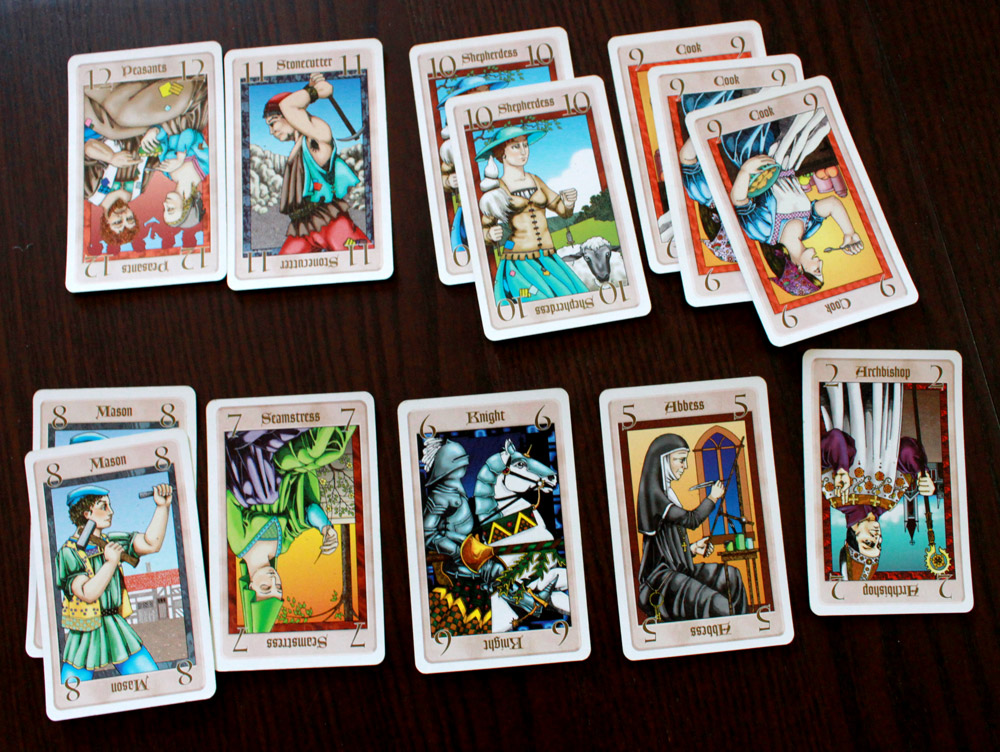
The Great Dalmuti. Social class is the card numbers (1 is highest) Source.
I'd like to see a recognition of the subliminally learnt violent messages in all these games, and publishers, designers and critics to take seriously the themes as a central part of the experience rather than a disposable layer of design fluff. I'd like us to think more about how we absorb knowledge even when placing a block of wood, and move past colonialist themes into something new, and more exciting.
Footnotes
- [1]: In Civ V this is certainly true: honestly I can't remember how viable non-military victories were in the original.
- [2]: Some of these themes were attempted in Civ 4 and taken out for Civ 5
- [3]: Yes, Civ has "great people" but these are a very surface mechanic which just contributes a large amount of hammers/culture and doesn't really make a substantive game change in the same way say, the invention of artillary does to warfare. I could concede this point though.